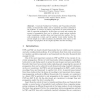Free Online Productivity Tools
i2Speak
i2Symbol
i2OCR
iTex2Img
iWeb2Print
iWeb2Shot
i2Type
iPdf2Split
iPdf2Merge
i2Bopomofo
i2Arabic
i2Style
i2Image
i2PDF
iLatex2Rtf
Sci2ools
89
Voted
CP
2006
Springer
2006
Springer
Propagation in CSP and SAT
Abstract. Constraint Satisfaction Problems and Propositional Satisfiability, are frameworks widely used to represent and solve combinatorial problems. A concept of primary importance in both frameworks is that of constraint propagation. In this paper we study and compare the amount of propagation that can be achieved, using various methods, when translating a problem from one framework into another. Our results complement, extend, and tie together recent similar studies. We provide insight as to which translation is preferable, with respect to the strength of propagation in the original problem and the encodings.
Artificial Intelligence | Constraint Propagation | Constraint Satisfaction Problems | CP 2006 | Propositional Satisfiability |
Related Content
| Added | 20 Aug 2010 |
| Updated | 20 Aug 2010 |
| Type | Conference |
| Year | 2006 |
| Where | CP |
| Authors | Yannis Dimopoulos, Kostas Stergiou |
Comments (0)

